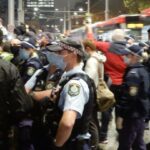Far-Right Israeli Government Moves to Undermine Power of the Judiciary

Israel’s democratic standing has long been questionable, as it operates as an apartheid state. However, the current Netanyahu coalition government, the most right-wing administration the nation has ever seen, is set to erode democracy even further.
Israeli justice minister Yariv Levin published a series of draft bills in January that provide the Knesset, Israeli parliament, with the power to appoint judges and overturn precedents set by the courts, whilst eroding the judiciary’s power to strike down unjust laws.
Mass public demonstrations against the judicial reforms have occurred ever since. These escalated on Sunday, after Israeli president Benjamin Netanyahu dismissed defence minister Yoav Gallant over having publicly called for the reforms to be dropped.
During a speech last Saturday, Gallant asserted the reforms were proving so divisive that they pose a threat to national security. And in response to scenes on the street, Netanyahu suspended the legislation, then before parliament, until after a parliamentary recess.
Abolishing checks on power
Similar to the Australian system, Israeli democracy involves the separation of powers, which sees government divided into three branches – the executive, the legislature and the judiciary – with each serving to limit the power of the others.
In this manner, the judiciary has the ability to strike down laws passed by the legislature that it finds to be unjust or, as in the case of Israel, aren’t in accordance with the nation’s basic laws, which operate as Israel’s de facto constitution.
Another key role of the judiciary is, in presiding over criminal and civil trials, its officers pass judgements that create precedents, which serve as common law authorities in future rulings.
The Levin-proposed justice reforms seek to rein in the Israeli judiciary’s ability to perform both these duties. Indeed, whilst the power to overturn laws will be seriously undermined, if a law does continue to be struck down, the Knesset will have the power to then reinstate it.
In terms of rulings, members of parliament will be able to vote on overturning them. And if these laws do see the light of day, the government will further have the power to appoint judges, as well as the president and vice president of the Israeli Supreme Court.
Apartheid state
Of course, any weakening of the Israeli judiciary will translate into a more authoritarian government, and whilst this will be detrimental for the rights of Israeli citizens, any such changes in this regard are set to impact Palestinians to a much greater degree.
Amnesty International released a report in February last year, in which it makes clear that the systematic discrimination and oppression Palestinians are subject to under rule of the Israeli state constitutes a system of apartheid.
Speaking on Democracy Now, Palestinian American analyst Yousef Munayyer said the judiciary has long neglected Palestinians, and while the protests display Israelis upset about their own rights infringements, a lack of outrage in the past shows disregard for the plight of the Palestinians.
In response to a general strike on Monday, Netanyahu also granted ultraconservative national security minister Itamar Ben-Gvir control over a new national guard, yet to be established, that will likely be used to crackdown further on Palestinians in both Israel itself and the occupied territories.
Munayyer added that Palestinians are in “a position of extreme vulnerability right now”, as “these religious nationalists, who have really carried out scores of attacks against Palestinians in villages in the West Bank and elsewhere, are increasingly being empowered right now”.
“So, there’s certainly greater concern now than, I think, ever before about the physical safety of Palestinians, who are, as always, going to pay the heaviest price for what is taking place in Israel today,” he further warned.







